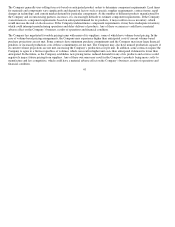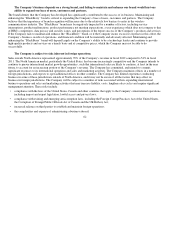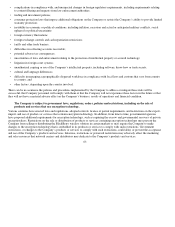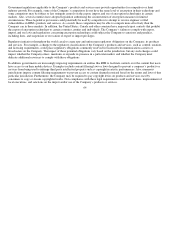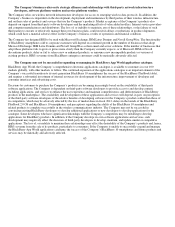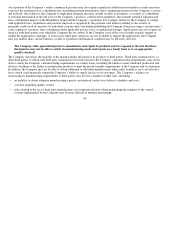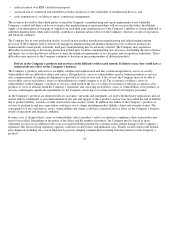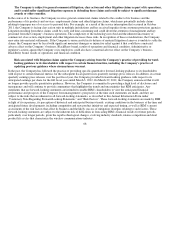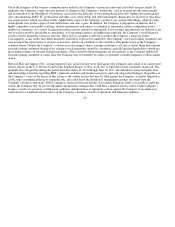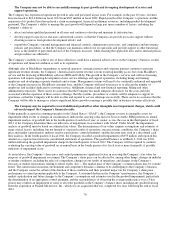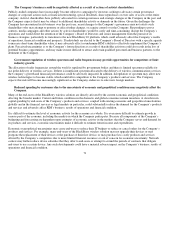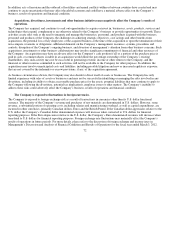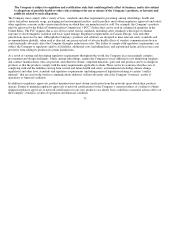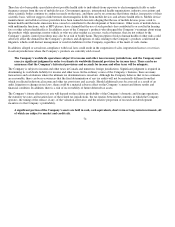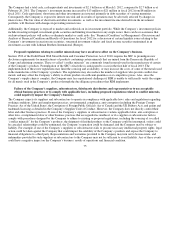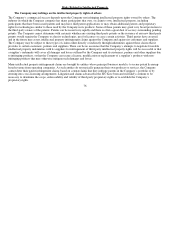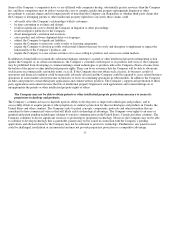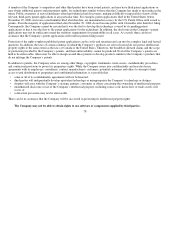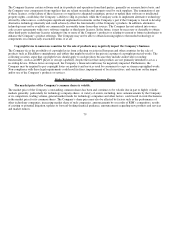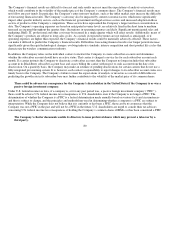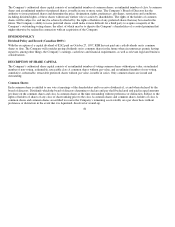Blackberry 2012 Annual Report Download - page 79
Download and view the complete annual report
Please find page 79 of the 2012 Blackberry annual report below. You can navigate through the pages in the report by either clicking on the pages listed below, or by using the keyword search tool below to find specific information within the annual report.
The Company’s business could be negatively affected as a result of actions of activist shareholders.
Publicly-traded companies have increasingly become subject to campaigns by investors seeking to advocate certain governance
changes or corporate actions such as financial restructuring, special dividends, share repurchases or even sales of assets or the entire
company. Activist shareholders have publicly advocated for certain governance and strategic changes at the Company in the past, and
the Company expects that it may be subject to additional shareholder activity or demands in the future. Given the challenges the
Company has encountered in its business over the past year, recent changes to the Company’s governance may not satisfy such
shareholders who may attempt to promote or effect further changes, or acquire control over the Company. Responding to proxy
contests, media campaigns and other actions by activist shareholders would be costly and time-consuming, disrupt the Company’s
operations and would divert the attention of the Company’s Board of Directors and senior management from the pursuit of its
business strategies, particularly its transition to the new BlackBerry 10 platform, which could adversely affect the Company’s results
of operations, financial condition and prospects. If individuals are elected to the Company’s Board of Directors with a specific agenda
to increase short-term shareholder value, it may adversely affect or undermine RIM’s ability to effectively implement the Company’s
plans. Perceived uncertainties as to the Company’s future direction as a result of shareholder activism could also result in the loss of
potential business opportunities, and may make it more difficult to attract and retain qualified personnel and business partners, to the
detriment of the Company.
Government regulation of wireless spectrum and radio frequencies may provide opportunities for competitors or limit
industry growth.
The allocation of radio frequencies around the world is regulated by government bodies and there is limited spectrum available for
use in the delivery of wireless services. If there is insufficient spectrum allocated to the delivery of wireless communications services,
the Company’s growth and financial performance could be adversely impacted. In addition, deregulation of spectrum may allow new
wireless technologies to become viable, which could offer competition to the Company’s products and services. The Company
expects this risk will become increasingly significant as the Company endeavors to enter new foreign markets.
Reduced spending by customers due to the uncertainty of economic and geopolitical conditions may negatively affect the
Company.
Many of the end-users of the BlackBerry wireless solution are directly affected by the current economic and geopolitical conditions
affecting the broader market. Current and future conditions in the domestic and global economies remain uncertain. A slowdown in
capital spending by end-users of the Company’s products and services, coupled with existing economic and geopolitical uncertainties
globally and in the financial services or legal markets in particular, could substantially reduce the demand for the Company’s products
and services and adversely affect RIM’s business, results of operations and financial condition.
It is difficult to estimate the level of economic activity for the economy as a whole. It is even more difficult to estimate growth in
various parts of the economy, including the markets in which the Company participates. Because all components of the Company’s
budgeting and forecasting are dependent upon estimates of economic activity in the markets that the Company serves and demand for
its products and services, economic uncertainties make it difficult to estimate future income and expenditures.
Economic or geopolitical uncertainties may cause end-users to reduce their IT budgets or reduce or cancel orders for the Company’s
products and services. For example, many end-users of the BlackBerry wireless solution may not upgrade their devices or may
postpone the replacement of their devices or the purchase of their first device, or may purchase less costly products and services
offered by the Company’s competitors due to more limited financial resources or out of concern for economic uncertainty. Network
carriers may further reduce device subsidies that they offer to end-users or attempt to extend the periods of contracts that obligate
end-users to use a certain device. Any such developments could have a material adverse impact on the Company’s business, results of
operations and financial condition.
71


